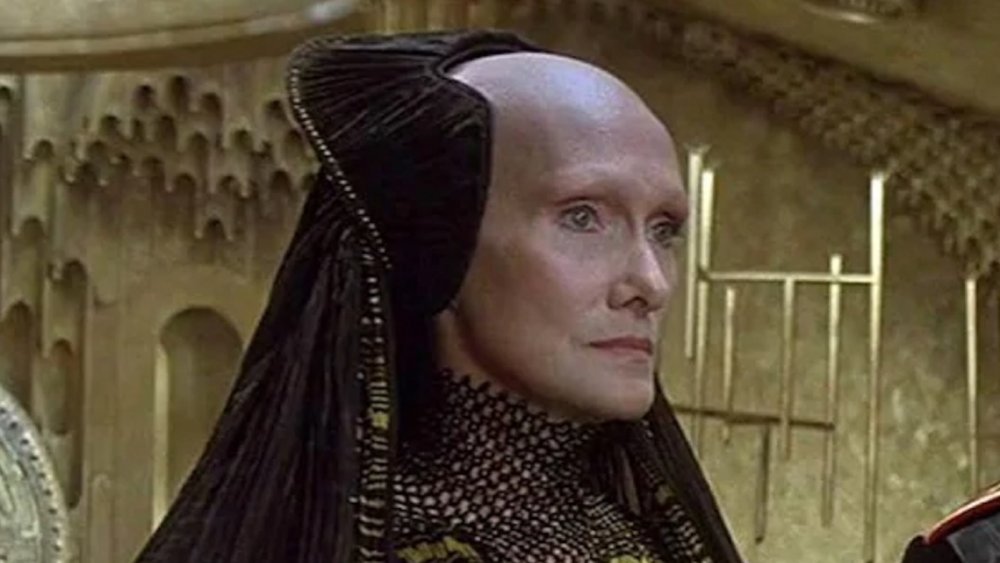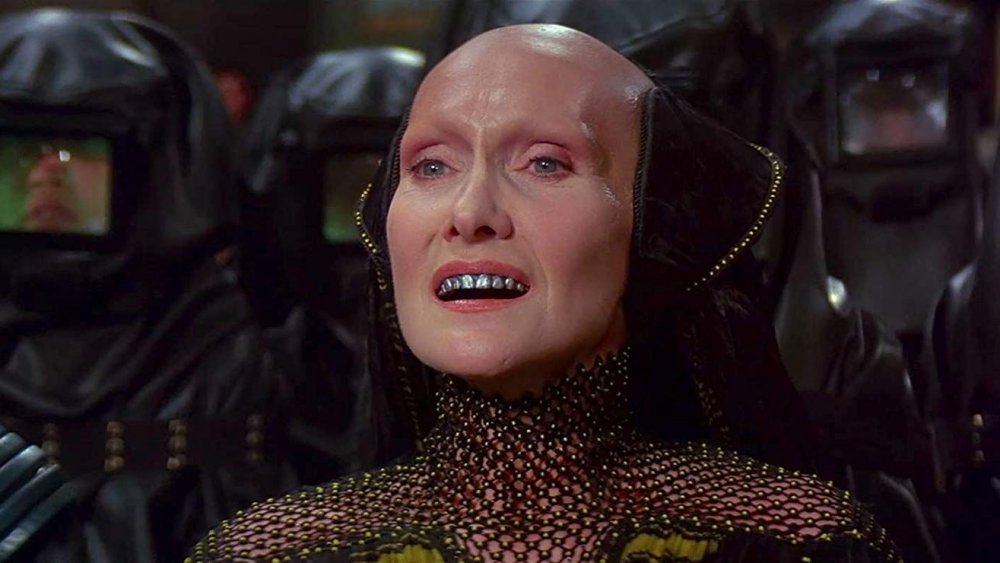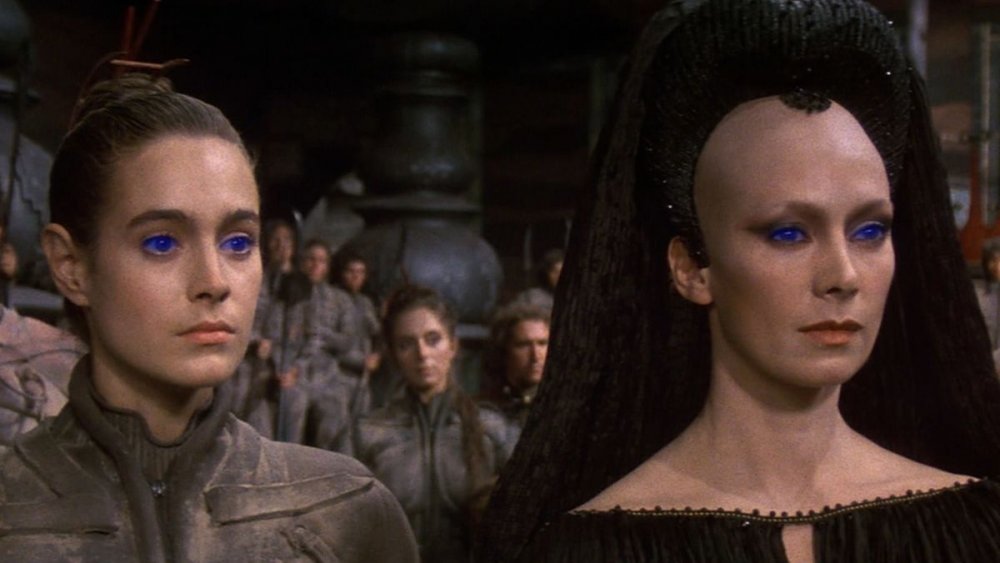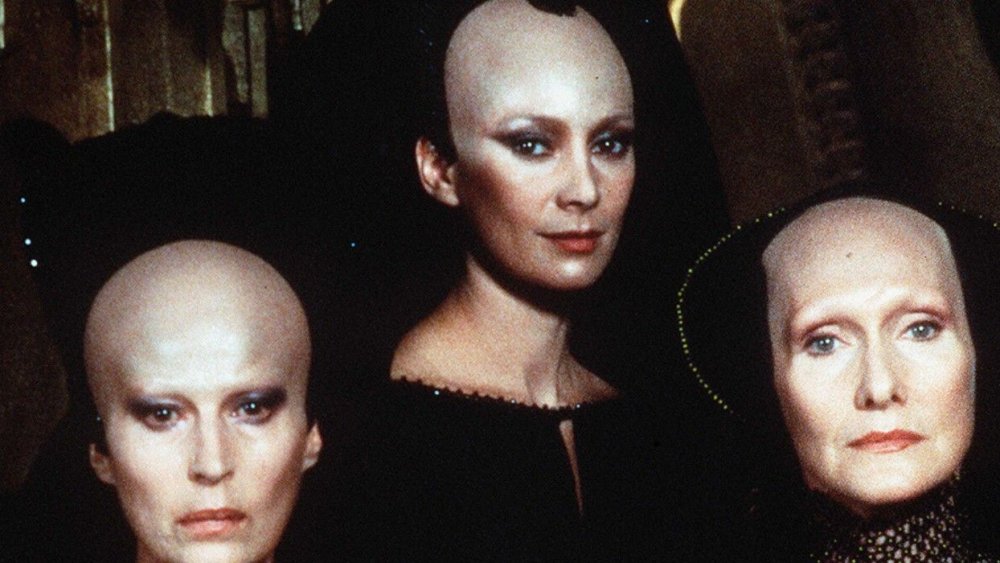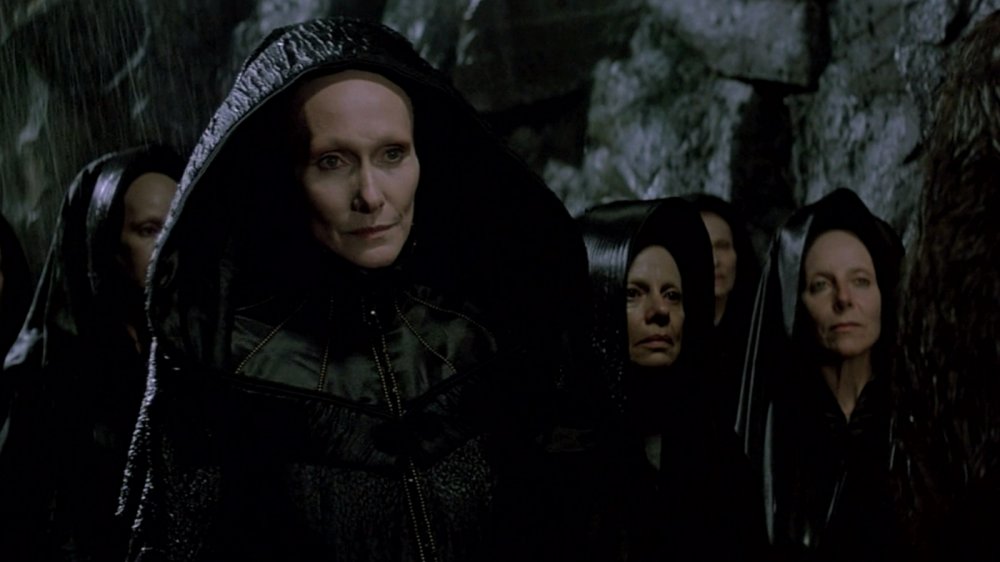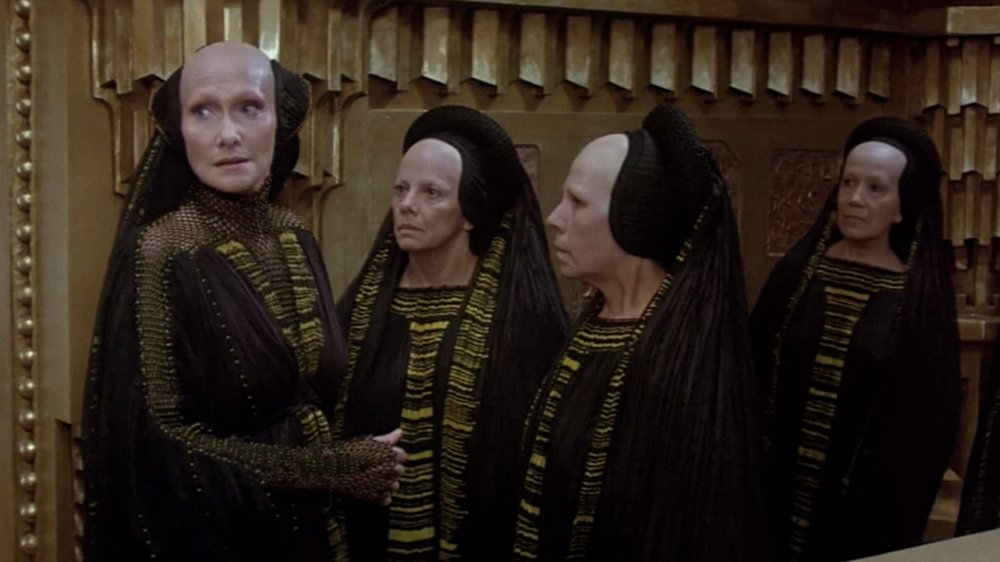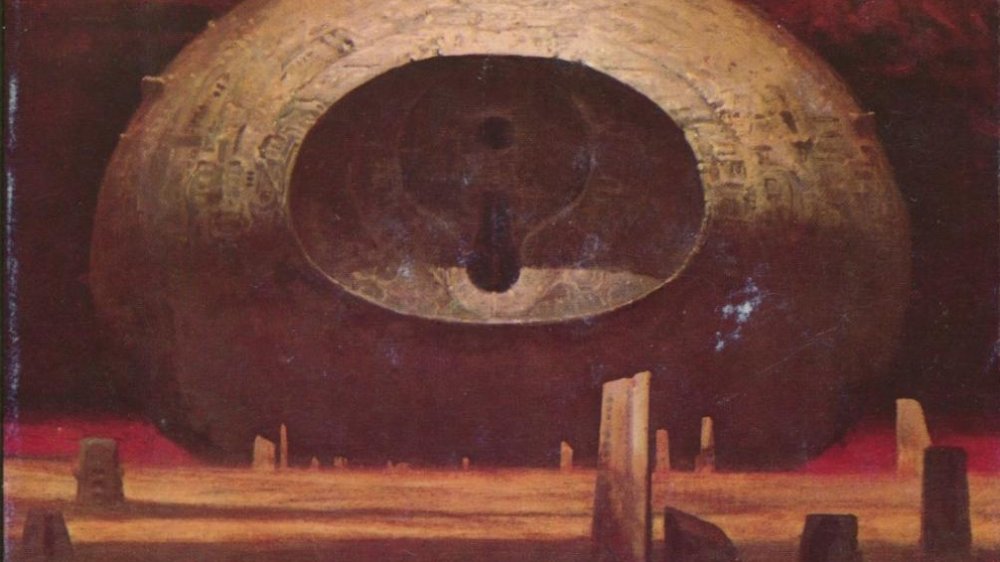The Backstory Of Dune's Bene Gesserit Explained
Like any great work of sci-fi, Frank Herbert's Dune projects the ideas of his time into the far future. The currents running through the American counterculture of the 1960s, ranging from ecology to mysticism, define the seminal novel and every adaptation of it. Exploration of these themes plots out a world of a galaxy-traveling humans, locked within a parable of indigenous rights and oil wars. It's a sprawling story, and yet a deeply familiar one all the same: Readers might not be terraforming desert planets, overthrowing galactic empires, or ingesting mysterious substances that allow them to see outside their own time and experience, but they know what it is to live within a world of competing creeds, in which the balance of power shifts according to thousands of variables, ranging from ecological devastation to resource scarcity.
Several aspects of our species' development are blown up against the backdrop of Dune's futuristic empire. Time (and Herbert's huge imagination) has grown, warped and altered humanity in fascinating ways. There are whisperings of a long-ago "Butlerian Jihad," in which humans rebelled against the computers that were gradually taking over their lives. Feudalism reasserted itself as humanity spread out to new, undeveloped planets. And then there is the Bene Gesserit order. This sisterhood takes concepts of religion, corporatization, and evolution to bizarre and mesmerizing extremes, ending up as one of the most intriguing parts of the Dune universe. This is their story.
Origins
Herbert imagined a world in which a particular group of powerful women tap into their powers of creation at the most primal level. They don't just take control of themselves — they take control of the universe and guide it down a very specific path, while holding no legal power themselves. Through rigorous training and use of the spice melange, a substance which grants them tremendous degrees of prescience, the Bene Gesserit develop incredible powers of observation, control, and focus. With these skills, they steer kings, powerful families, and the common man towards what they believe to be the ideal design for the universe.
The Bene Gesserit were born, like most new philosophies and religions, in a time of decline and chaos. While their actual origin isn't discussed in tremendous detail, it is known that they appeared after the Butlerian Jihad. In this time, humanity was suffering through a dark age, as all of their computers had been destroyed in a galaxy-wide conflagration. Machines that can think in the manner of humans were banned, and much of history was lost in their destruction. Two major philosophical movements came out of this time of warfare, bloodshed, and paranoia: The Bene Gesserit tradition, and the Orange Catholic Bible, which combines aspects of all humanity's major religions into one doctrine.
Universe-spanning aims
A charitable reading of the Bene Gesserit's goals would say they're seeking stability. And in a way, they are. All powerful entities crave stability, after all, because chaos holds the possibility of falling out of power. But in truth, what they are seeking is control over the galaxy's governmental and economic affairs. The Bene Gesserit insert their followers into powerful families via marriage, allowing them to control the movements of the government's key players. They also recruit women from royal families into their training, so as to further their mission and bring new bloodlines into their breeding program.
The religious aspects of the Bene Gesserit emerge largely through this program. A messianic order, they work in the hopes that their machinations will eventually lead to the creation of a chosen one called the Kwisatz Haderach. The sisters of this order contain great powers, but know that there is a portion of prescience that they cannot reach, frequently described as a locked room by the practitioners powerful enough to comprehend it. What keeps them from this last little bit of power is their female nature. Thus, they hope to direct bloodlines until such time as they can create a male capable of learning their powers of observation and control.
An extraordinary education
The Bene Gesserit have a school on the planet of Wallach IX. While their mission is spread by teachers throughout the universe, only adepts trained at the central school by the most talented leaders (called Reverend Mothers) are deemed fit to marry into the most critical bloodlines. These future wives of emperors and powerful kings are trained on Wallach and entrusted with the most crucial aspects of their messianic mission. They are the best of the best, and having one as one's wife is a major status symbol.
It's not all etiquette and marriage for the Bene Gesserit, however — they are also trained in the use of violence and outright mind control. Sisters of the Bene Gesserit are phenomenally skilled fighters, trained in the Weirding Way of combat. Moreover, they are able to control people with their voice, and can shift the most minute processes in their own bodies to halt poisons and illnesses. They can also become Truthsayers, who are exclusively trained on Wallach. These incredibly perceptive women are a valuable commodity for galactic leaders, as they can detect when a person is lying.
Missionary work
Beyond making their trainees desirable to powerful families via unique skills, the Bene Gesserit also seed prophecies among laypeople of the galaxy to ease the implementation of their own goals. Throughout the galactic frontier, Bene Gesserit missionaries spread stories of a coming champion, who is remarkably similar to their own Kwisatz Haderach. This way, if the Bene Gesserit's king of kings appears and the order attempts to overtake the galaxy, the common people will see it as the fulfillment of their own religious beliefs.
This so-called Missionaria Protectiva also provides cover to Bene Gesserit followers in the short-term. Should an adept find themselves on a strange world or in hostile territory, she can feel out the people around her, to see if Bene Gesserit ideas have reached that place. A Bene Gesserit familiar with the myths that have been seeded can cast herself as a prophet or religious teacher to ensure her own safety. These myths are typically seeded only on incredibly dangerous planets, where the Bene Gesserit fear that even their advanced powers of perception and control would not be enough to stay safe. As such, the presence of these myths also serves as a warning sign, letting a practitioner know that she is in volatile territory.
A great betrayal
After centuries of breeding and scheming, the Bene Gesserit finally stand on the precipice of creating their messiah in Dune. They hope that the Lady Jessica Atreides will bear a daughter with Duke Leto Atreides, who can then be married to a son of their rival family, the Harkonnens. This final bit of stability and peace, coupled with the noble bloodlines of the two families and the guidance of Bene Gesserit sisters in both houses, will create a son who can be made into the Kwisatz Haderach. Bene Gesserit adepts' extreme control over their bodily processes means that they can decide whether or not to supply X or Y chromosomes to their unborn child. But Lady Jessica goes against the ruling of her Bene Gesserit elders and opts to have a son with the Duke. She deeply loves him, and he wants a male heir to continue the Atreides bloodline.
This betrayal, coupled with Jessica's training of her young son, creates a Kwisatz Haderach who is not under the sway of the Bene Gesserit order. In fact, her son, Paul Atreides, is the worst possible outcome for the order: He's a messianic figure with god-like powers, born to someone viewed as a traitor.
The Kwisatz Haderach arrives
After Lady Jessica and her son escape an assassination attempt by the Harkonnen clan, they are taken in by desert dwellers on the planet Arrakis, colloquially known as Dune. Jessica users her knowledge of the Missionaria Protectiva to ingratiate herself with the planet's desert nomads, known as Fremen. Paul's incredible powers of prescience, coupled with her knowledge of Fremen culture and the production of the planet's all-important spice melange, turn him into a revolutionary figure on the planet. He leads the Fremen in a revolt that threatens to cripple the production of the galaxy's most important commodity.
The Kwisatz Haderach shows himself to be entirely outside of any controls placed on him by the Bene Gesserit or the galactic empire. Rather than allow the spice to be destroyed, the emperor steps down and Paul Atreides takes the throne. His Fremen warriors carry out a crusade across the galaxy and Paul becomes the god-king of millions of worlds.
Completely cowed
Seeing their power diminished, the Bene Gesserit conspire to kill the emperor with the help of disgruntled veterans of his wars and the guild of space navigators. A nuclear attack on the capital city leaves Paul blind, but his prescience allows him to function as if he can see. Fremen superstition around blind people, and their harsh traditions surrounding those who might slow down a tribe, turn Paul into a simultaneously revered and reviled figure among his most devout followers. Rather than allow these feelings to fester, Paul completes his own messianic myth by walking out into the desert in accordance with Fremen tradition. He appears to sacrifice himself, to show that he is not above the rules that govern his people.
A regeneration of goodwill takes place, whihc carries over to his son, Leto II. Over the course of his 3,500 years as ruler, Leto II brings the Bene Gesserit to heel via tight-fisted control of the spice. Leto II is quite a lot like the Bene Gesserit, however: He sees that humanity needs to be guided along the proper route. He uses his complete control of the spice melange to force various orders and families to carry out his plans. He also reinvigorates the Bene Gesserit breeding program under his own watch. After becoming a human-sandworm hybrid, Leto II follows a similar path to his father: He allows himself to be killed, seeing that it will propel humanity down the path he has chosen.
The end of the Bene Gesserit?
The Bene Gesserit are very nearly wiped out by the all-seeing Leto II. However, myths and legends like the Missionaria Protectiva have a funny way of sticking around. For years, the Bene Gesserit hold on as a diminished cult, and are able to regain a bit of their power after Leto II allows himself to be assassinated.
Leto II's plan is to suppress the intermingling and easy travel of the Padishah Empire and his brother's own rule. Siloing off the many settled worlds in his imperium over thousands of years reconfigures humanity, as distinct cultures thrive on far-flung worlds. After his death, these disparate cultures began to interact and grow beyond the confines of the empire in a period called The Scattering. In forcing humanity to diversify and evolve, Leto II hopes they'll become more able to face the approaching threat he's seen in his prescient visions. He calls this way "The Golden Path."
After Leto's death, the Bene Gesserit gain access to the spice in a way they haven't had for thousands of years (though still well off from their Padishah peak). As the only presence left in the universe with the gift of prescience, they can see the contours of the timeline that Leto II created. Thus, they know that the tyrant emperor set humanity on an intentional path — but they have to decide among themselves whether to carry it forward.
Establishing Chapterhouse
The Bene Gesserit face a complex choice in the wake of Leto II's death. On the one hand, they might reassume control over the flow of history, as they had before Paul Atreides changed their plans (and the universe) forever. On the other hand, they might opt to follow the ideas of the two men who did more damage to their order than any other force, person, or ruler in the galaxy. Taking this latter option seems, at first, unlikely, but remember: Unlike all others, they are uniquely able to grasp the far-seeing goals of Leto II's plan. They ultimately allow the Golden Path to carry on, setting their powers on establishing a world on which they won't be dependent on noble families and royals for power.
Though these times are entirely different for the Bene Gesserit, compared to their prior rule, many things haven't changed for them. Chiefly, the spice is still crucial to their way of life, and still only available on the desert planet of Arrakis. The Bene Gesserit manage to regain enough composure to relocate their base of operations to a new world called Chapterhouse. Knowing full well what can come if someone seizes control of the spice melange, the Reverend Mothers hatch a plan to begin a spice operation on their new planet. They are ultimately successful in bringing a sandworm to Chapterhouse and begin the spice production cycle on a world they can control.
A competing order
Setting up spice production on their own planet might seem like a perfect outcome for the Bene Gesserit. But things are not well outside their own planet. A new matriarchal order of powerful adepts crops up in the far-flung parts of the galaxy, and they are not at all reliant on the spice to obtain their powers. The Honored Matres have earned a reputation as brutes, destroying or enslaving nearly every planet they come across. The soft power of the Bene Gesserit thus faces a true threat, from a mystical order that can overpower them in multiple ways.
After several encounters with the leadership of the Honored Matres, the Reverend Mothers realize that the Matres are themselves fleeing a destructive force from outside the known universe. They hatch a plan to ensure the survival of both orders. The highest Reverend Mother tells her order to train a captured Matre in the ways of the Bene Gesserit. After she is fully assimilated into their program, the Bene Gesserit pick her as a champion to fight the leader of the Matres. When the Matres' commander is defeated, the Bene Gesserit take control of the enemy faction and christen it the New Sisterhood. While this is technically the end of the Bene Gesserit, the order carries on in its new form to fight the revived threat of artificially intelligent computers, thought to be expelled from the universe in the Butlerian Jihad.
An unfinished story
The ultimate fate of the Bene Gesserit, at least as Frank Herbert intended, is not known. In the last full Dune book he wrote, Chapterhouse: Dune, the Bene Gesserit are consumed with considering the fate of their eons-old order. They have to grapple with the question of whether it's more important for their traditions to remain unchanged and entirely intact, unspoiled by a changing universe, or if it is more wise to accept some degree of change, in the hopes that a vestige of Bene Gesserit beliefs might survive. They decide to merge their order with the attacking Honored Matres, so that both groups can assure some form of their traditions will carry on into the future. However, Herbert's final book never makes clear what, exactly, that future might hold.
It is clear that mysterious god-like figures who exist outside of the known universe are about to come into play — nameless, powerful entities appear at the very end of Chapterhouse: Dune, promising a massive conflict to come. In two sequels reportedly drawn from Herbert's notes on "Dune 7," his son Brian Herbert concludes the story of the Bene Gesserit after humanity ultimately comes to terms with artificial intelligence from the days of the Butlerian Jihad. The Bene Gesserit are able to restart their breeding program with a goal entirely opposite to their original one: Now, they'll work to ensure that nothing like the Kwisatz Haderach ever comes back into the universe.
